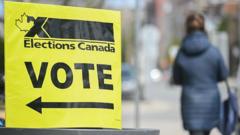With less than a week before election day, more than 7 million Canadians—about a quarter of eligible voters—have participated in early voting, setting a new benchmark for advance ballots, according to Elections Canada. These advance polling stations operated for four days, between Friday and Monday of the Easter long weekend, leading to immense turnout, particularly with 2 million votes cast just on the first day.
Mail-in voting has also seen a notable increase, with over 754,000 ballots returned to Elections Canada, surpassing the 660,000 from the 2021 elections. This surge in participation occurs amid a tumultuous campaign period, as federal leaders scramble to sway undecided voters in the final stretch of their campaigning efforts.
Latest polling indicates that the Liberal Party holds a 5-point lead over the Conservative Party. Liberal leader Mark Carney has been emphasizing his party's capability to effectively respond to challenges posed by U.S. President Donald Trump and the accompanying trade disputes, asserting that his rival, Conservative leader Pierre Poilievre, lacks a tangible plan in this regard.
The economic implications of Trump's 25% tariffs on Canadian goods have been a focal point of concern, particularly for the struggling auto sector. Carney's appeal includes a gradual turnaround of fortunes for the Liberals following a tumultuous period after former Prime Minister Justin Trudeau's resignation, which saw the party's polling plummet to just 20%.
In contrast, Poilievre's campaign centers around calls for change, addressing pressing concerns including high living costs, housing, and crime—a strategy that seeks to resonate with voters tired of nine years of Liberal governance.
As the election approaches, polls suggest the Bloc Quebecois is positioned in third place, while the New Democratic Party appears to be trailing behind in fourth. The increasing engagement among voters underscores the vibrancy of Canadian democracy heading into the crucial election.
Mail-in voting has also seen a notable increase, with over 754,000 ballots returned to Elections Canada, surpassing the 660,000 from the 2021 elections. This surge in participation occurs amid a tumultuous campaign period, as federal leaders scramble to sway undecided voters in the final stretch of their campaigning efforts.
Latest polling indicates that the Liberal Party holds a 5-point lead over the Conservative Party. Liberal leader Mark Carney has been emphasizing his party's capability to effectively respond to challenges posed by U.S. President Donald Trump and the accompanying trade disputes, asserting that his rival, Conservative leader Pierre Poilievre, lacks a tangible plan in this regard.
The economic implications of Trump's 25% tariffs on Canadian goods have been a focal point of concern, particularly for the struggling auto sector. Carney's appeal includes a gradual turnaround of fortunes for the Liberals following a tumultuous period after former Prime Minister Justin Trudeau's resignation, which saw the party's polling plummet to just 20%.
In contrast, Poilievre's campaign centers around calls for change, addressing pressing concerns including high living costs, housing, and crime—a strategy that seeks to resonate with voters tired of nine years of Liberal governance.
As the election approaches, polls suggest the Bloc Quebecois is positioned in third place, while the New Democratic Party appears to be trailing behind in fourth. The increasing engagement among voters underscores the vibrancy of Canadian democracy heading into the crucial election.

















